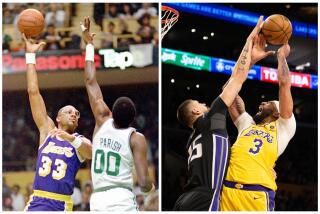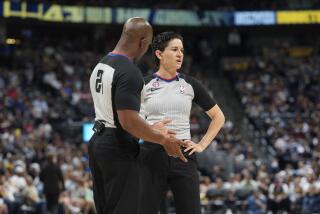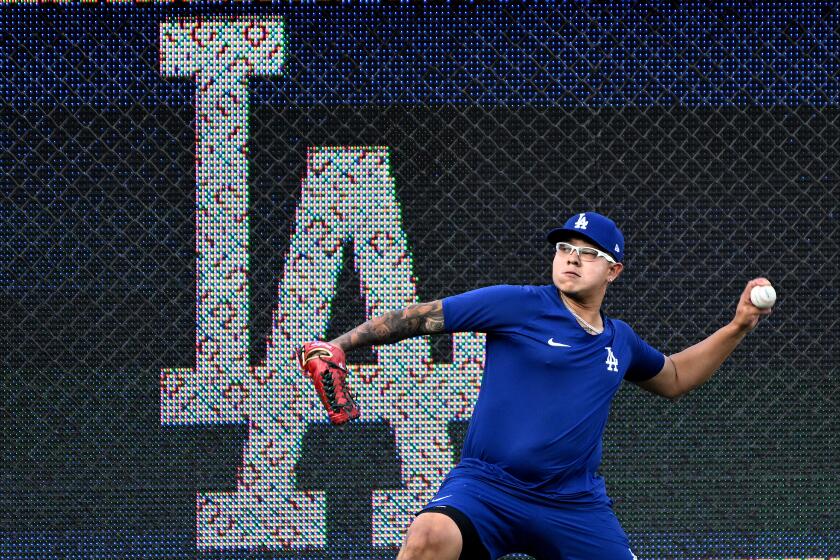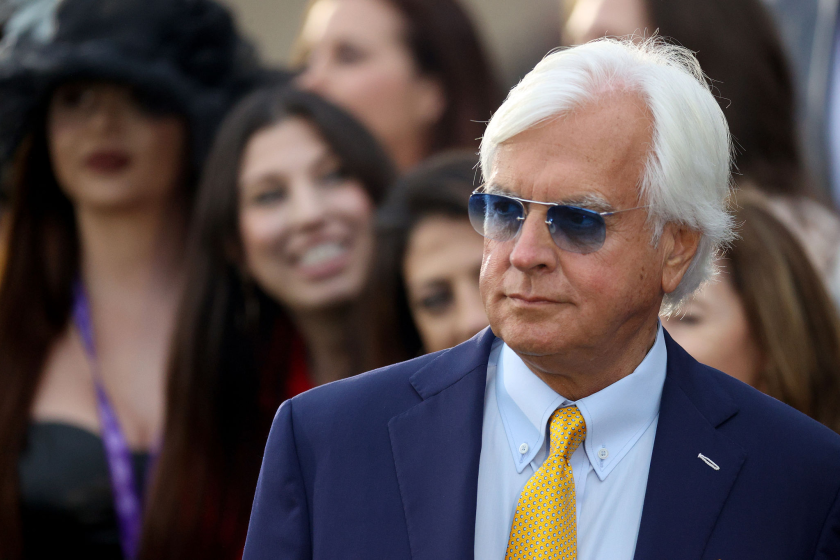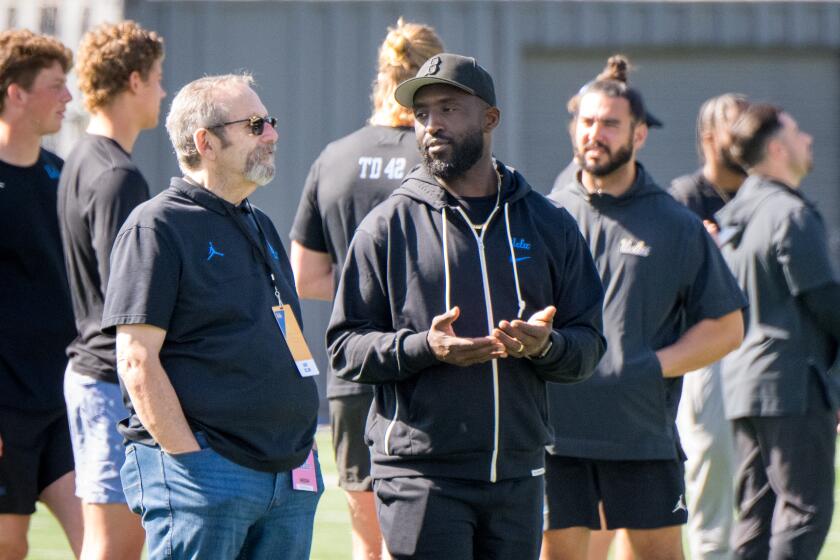NBA veteran Jason Collins is first active player to say he is gay
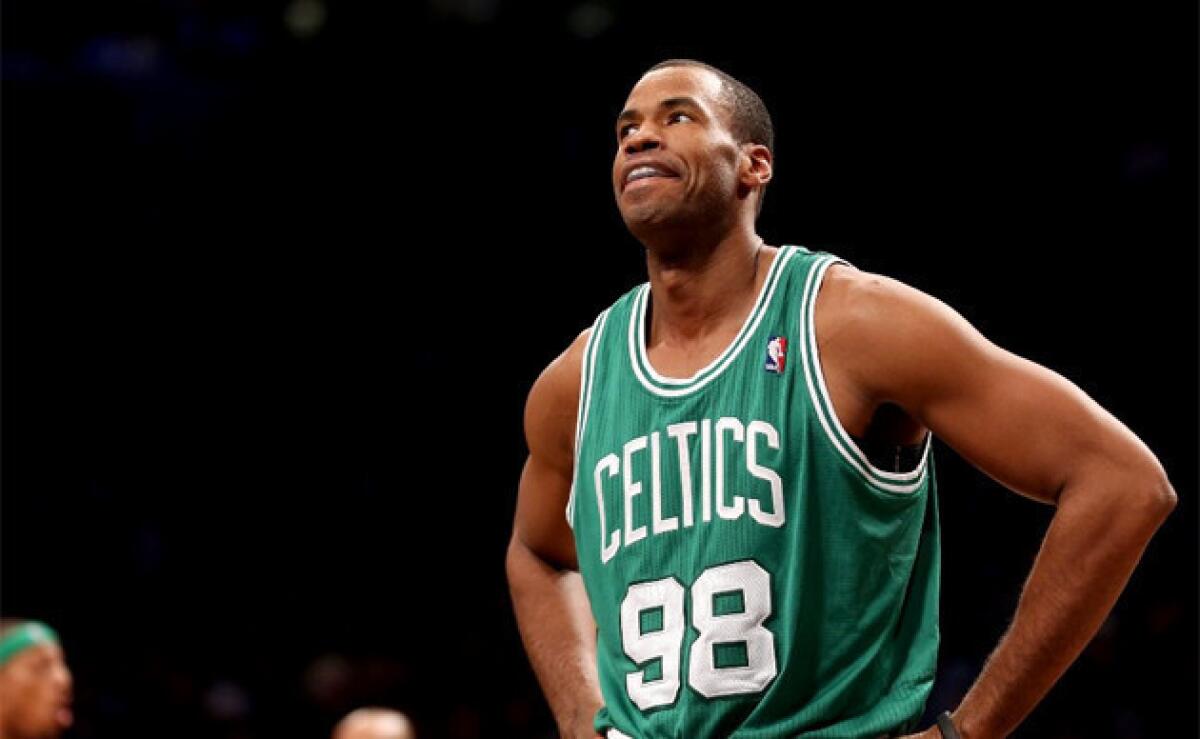
Jason Collins had long been keeping a secret.
As a standout high school player at Harvard-Westlake School, as a star at Stanford and through a 12-year NBA career, he had hidden something fundamental about himself from his family, friends and teammates.
On Monday Collins came out, becoming the first active male athlete in a major U.S. professional team sport to acknowledge he was gay.
The reaction was swift. President Obama, who just last year gave his support for gay marriage, called Collins to say “he was impressed by his courage,” according to a White House Twitter post.
Former President Clinton, whose daughter, Chelsea, was a classmate of Collins’ at Stanford, said Collins’ action was “an important moment for professional sports.” Clinton praised the basketball player as “a good man who wants no more than what so many of us seek: to be able to be who we are; to do our work; to build families and to contribute to our communities.”
The reaction from the sports world was overwhelmingly positive, especially from the NBA, where many players tweeted their support of Collins’ decision. Commissioner David Stern credited Collins with assuming a “leadership mantle on this very important issue.”
Lakers star Kobe Bryant, who two years ago was fined $100,000 by the NBA for directing an anti-gay slur at an official, used his Twitter feed to say he was proud of Collins, advising him not to “suffocate who u r because of the ignorance of others.”
Former Lakers star Shaquille O’Neal thanked Collins for “showing all of us what leadership looks like.”
Collins chose to make his sexuality public in an article that will be published May 6 in Sports Illustrated. In the story that was posted online Monday, he wrote with passion about how difficult it was for him to remain silent last month, when he was playing for the Washington Wizards in an arena a few blocks from the Supreme Court as the justices were hearing arguments regarding same-sex marriage.
“Here was my chance to be heard,” Collins wrote, “and I couldn’t say a thing. I didn’t want to answer questions and draw attention to myself. Not while I was still playing.”
But an even more recent event — the Boston Marathon bombings — changed his mind. “I shouldn’t wait for the circumstances of my coming out to be perfect,” he wrote. “Things can change in an instant, so why not live truthfully?”
The outpouring of support was especially welcome and surprising to Wade Davis, a former NFL player. Davis so feared the reaction of teammates and former teammates he stayed closeted until eight years after his last NFL game.
“This is groundbreaking on so many different levels,” Davis said, acknowledging that he may have been wrong on how people would react. “Once we actually do [come out], we’re like, ‘Wow, that was much easier than I ever imagined.’ ”
Whether all that goodwill leads to a job offer for Collins, a 7-footer from Northridge, remains to be seen. A 34-year-old free agent who averaged 10 minutes and slightly more than a point a game for the Boston Celtics and Wizards last season, Collins probably would have had a tough time landing a contract offer even before coming out. If recent history is any indication, his admission won’t make that road any smoother.
It’s not known how fans will react should he return to the court. One indication could come soon as the Boston Red Sox have invited him to throw out the ceremonial first pitch at a game.
Soccer player David Testo, a decorated midfielder with the Montreal Impact of the second-tier North American Soccer League, came out on a Canadian TV show 17 months ago. The initial reaction was very positive. But his contract had expired two weeks earlier and after his announcement the phone stopped ringing.
The five major U.S.-based professional sports leagues all have policies that prohibit discrimination based on sexual orientation, yet clubhouses and locker rooms can be difficult places to police.
“That’s why we haven’t seen this happen before, because there is a risk,” said Michael Messner, a professor of sociology and gender studies at USC who writes about masculinity in sports. “Sports has really been one of the most locked-down, closeted institutions for men, especially at the professional level. It takes a real act of bravery to come out.
“There’s endorsements. There’s the risk of how fans might treat you. And especially the risk of how your organization, how your teammates are going to treat you.”
The Clippers’ Grant Hill, who praised Collins on Monday, said earlier this season that gays are “still taboo in the locker room” while defensive back Chris Culliver of the San Francisco 49ers was forced to apologize just before February’s Super Bowl after saying that he would not accept a gay teammate.
Last week Minnesota punter Chris Kluwe, an outspoken proponent of gay rights, said his advocacy could cost him his job after the Vikings took UCLA punter Jeff Locke in the fifth round of the NFL draft.
Working to Collins’ advantage, Davis said, is that he played for six teams during his NBA career.
“He’s going to have hundreds of teammates who are probably going to come out and say, ‘You know what? Jason has always been great and nothing’s different,’ ” Davis said.
“Teammates are going to speak positively, which makes every other person think, ‘Maybe I’m wrong here. Maybe this is not a big deal.’ ”
It was the feeling of Clippers guard Jamal Crawford, who played with Collins for two seasons in Atlanta.
“He was always a professional,” Crawford said. “I think he’ll have the support of everybody.”
Collins said he considered coming out publicly during the NBA lockout two years ago, and first disclosed his homosexuality to his aunt, San Francisco Superior Court Judge Teri L. Jackson.
It made sense given the Jackson family history of fighting discrimination. Jackson’s parents — Collins’ grandparents — were active in the civil rights movement, and Jackson and her sister integrated their elementary school. Jackson was San Francisco’s first female, African American judge.
So Jackson’s advice to her nephew on his ground-breaking announcement was simple: Don’t let it define you.
“To be the first African American, female judge in San Francisco did not define me,” she said. “I am a good judge. ... Give me that opportunity, and I will excel. ... He did not become a great basketball player because of his sexual orientation. It’s because of Jason the man.”
Now that Collins has come out, gay rights activists are hoping athletes will no longer need to choose between truth and a career.
“This is the first domino,” said Patrick Burke, a scout with hockey’s Philadelphia Flyers and the founder of You Can Play, a group advocating equality for athletes regardless of sexual orientation. “The floodgates are about to open here.”
David Backes, captain of the NHL’s St. Louis Blues, went even further, saying that in his team’s dressing room the most important thing is what a player does on the ice, not what he does in his private life.
“If they’re good teammates and battle hard for you and put everything they’ve got into the game that they’re playing ... it’s no different than black/white, gay/straight, whatever. Three legs, four legs, five eyes, whatever you want to say,” he said. “Move on and keep playing, and good for him in having the confidence in being who he is.”
Twitter: @kbaxter11
Times staff writers Ben Bolch, Broderick Turner, Helene Elliott, Maria L. La Ganga and Ari Bloomekatz contributed to this report.
More to Read
Get our high school sports newsletter
Prep Rally is devoted to the SoCal high school sports experience, bringing you scores, stories and a behind-the-scenes look at what makes prep sports so popular.
You may occasionally receive promotional content from the Los Angeles Times.
